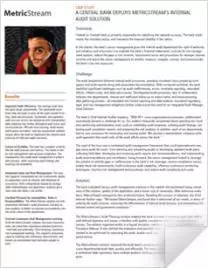
AI-First Connected GRC
Drive a Connected GRC Program for Improved Agility, Performance, and Resilience
Discover Connected GRC Solutions for Enterprise and Operational Resilience
Explore What Makes MetricStream the Right Choice for Our Customers
Discover How Our Collaborative Partnerships Drive Innovation and Success
- Want to become a Partner?
Your Insight Hub for Simpler, Smarter, Connected GRC
Implementing a well designed audit program
Overview
Best practices for incorporating audits into your operational framework and how to most effectively implement audits in a global organization.

In our previous issues, we discussed best practices for incorporating audits into your operational framework. In this issue, let us take the discussion further and pose the question, on how to most effectively implement audits in a global organization. To put the problem in context, let us look at a specific use case scenario at a large retail chain.
- A large and diverse retail organization selling convenience and fast food products has set up a global organization for field audit management. The fully staffed field audit team comprising of internal staff and contracted auditors are chartered to work closely with the store management, retail staff, company auditors and regional sales managers.
- Retail field audits are conducted to evaluate and reduce quality issues at shipping and receiving, reduce on-site safety incidents, achieve inventory loss prevention, and provide close-loop feedback for continuous improvement at the retail stores.
- The current process for managing field audits is manual and error-prone. Audits are conducted manually using photocopied questionnaires and checklists. Audit scores are manually assigned to test compliance with the corporate quality standards, safety guidelines and inventory loss prevention procedures and controls. The field auditors use a multi-sheet excel spreadsheet to conduct their scheduled and spot field audits, and upload the information to the corporate audit support team, who then summarizes the information and distribute the findings, compliance reports with the management. This manual approach of audits while provides the basic audit data, does not enable deep dive analysis on the root causes of audit scores. Audit metrics are hard to create, change and monitor, and therefore the organization lacks the ability to actually improve the audit scores, share best practices and improve quality and customer satisfaction.
Does this user case scenario sound familiar? This fast growing retail chain has incorporated audits into their operational framework, but are they most effectively implementing the audit process for maximum benefits to the organization? Here are some tips which we have seen work in many customer scenarios.
Requirements for a well-designed Field Audit program
In talking to our customers and industry analysts, we believe that a well-designed audit program must achieve the following at the minimum.
- Provide immediate access to all of the field audit data at any level, across the extended enterprise (corporate, stores, franchisees, suppliers etc.)
- Establish an audit database and warehouse across all the field locations to enable real-time and historical analytics, trend-analysis, and root cause analysis on inventory losses, safety and quality incidents.
- Automate and streamline the data entry process of the audit data to minimize errors.
- Enable auditors to distribute audit results to the store managers, distribution managers and executives.
- Enable auditors to review audit scores interactively with the store personnel and raise the audit scores through training and continuous improvement programs.
Top 5 Recommendations for implementing a well-designed Field Audit program
- Look for a solution that automates the entire audit process. A well-designed audit solution must meet all of the requirements discussed earlier. While one may start small with one aspect of audit management, it would pay to understand how your audit program would scale to deliver
- Automated reporting and analytics
- Online and offline audit data capture
- Integrated corrective action and incident tracking
- Integrated document and training management for Standard operating procedures (SOPs) and closed-loop training to improve audit scores.
- Look for a mobile solution, which is practical and usable for the field auditors. Many audit programs fail because the auditors find it hard to use the system while they are in the field conducting the audits. Forward thinking organizations are insisting on offline and mobile auditing solutions so that auditors can conduct the audit in the field and not have to re-enter their data when they come back to their office. Re-entry of audit data is the single most point of error, which we recommend is best avoided. Simple questions to ask and consider:
- Can the auditors email the audit forms? Can those emailed audit forms be automatically synced up with the centralized audit database?
- Can hand-held devices like PDAs be used to conduct audits?
- Are their built in real-time rules to check for data integrity at the point where auditors are capturing the audit data in the field?
- Look for a real-time audit solution. Remember, that the real goal of an audit program is to not just monitor the audit scores across your extended enterprise, but instead to raise the audit scores through real-time actions and processes. Simple questions to ask and consider:
- Can audit results be tightly integrated with corrective action and preventive action plans?
- Can audit scorecards trigger a well-integrated training program to raise the performance of the under performing units?
- Can the Standard Operating procedures and controls be modified effectively based on audit findings?
- Can the management drill down into specific audit failures and understand the root cause and trends?
- Look for an audit solution, which is auditable. A well-designed audit solution must be auditable in itself. You should be able to audit the auditors to ensure that the program is running as you expect it to run. Simple questions to ask and consider:
- Can you set up audits for the auditors?
- Can you train and manage your auditors to conform to your standard operating procedures?
- Do your field auditors believe that management and reviewers have full visibility into their data and results?
- Look for an audit solution, which can change with your business and processes. No matter which business or process you are trying to audit, changes are inevitable. New stores, new processes, future mergers and acquisitions will dictate that your audit methodology will evolve with time. Simple questions to ask and consider:
- Can you change the audit data or methodology?
- Can the audit scoring methodology be refined as you get more insights of your process or business?
- Can you enable and build new audit applications over time with the help of your IT staff or consultants?

Subscribe for Latest Updates
Subscribe Now





